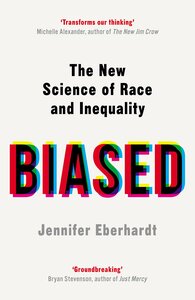Take a photo of a barcode or cover
challenging
emotional
hopeful
informative
reflective
medium-paced
Grateful to the people who suggested this book as a ProfDev read....and who brought the author to campus for a talk. Through detailed research, humanized with personal anecdotes, the author makes the concept of “implicit bias” easier to recognize and understand, and helps break-down the automatic-defensiveness that prevents true engagement.
I cannot recommend this book enough.
Also, I listened to it and I thoroughly enjoyed that medium.
Dr. Eberhardt has spent her life studying and consulting on bias. This was quite eye opening for me.
Also, I listened to it and I thoroughly enjoyed that medium.
Dr. Eberhardt has spent her life studying and consulting on bias. This was quite eye opening for me.
This is a good resource. I really enjoyed the author’s discussions of the behavioral studies that she was personally involved in running - very interesting situations and topics. However, I wish there had been more guidance or ideas regarding how we can reduce the impact of our biases.
A refreshing look at race
I loved Biased. There are so many books people recommend regularly in the world we currently live in, but no one had ever recommended this one. I will now recommend this to everyone. The book was a quick read and the use of science and psychology to explore race and bias was a refreshing and honest take. I was so intrigued I even looked up some of the studies mentioned.
I loved Biased. There are so many books people recommend regularly in the world we currently live in, but no one had ever recommended this one. I will now recommend this to everyone. The book was a quick read and the use of science and psychology to explore race and bias was a refreshing and honest take. I was so intrigued I even looked up some of the studies mentioned.
This book is written by a professor of psychology and she discusses bias with the support of many studies and statistics and facts. The book would be interesting if it ends there, but it doesn't. Eberhardt fills in the discussion of bias with her own personal experiences and important historical context. The combination of the three lenses: psychologist, personal, and historical is extremely effective. I thought the discussion of the history of housing (including government sanctioned racial discrimination) was particularly concise and informative. Along the way, Eberhardt provides examples of changes that can help counter bias and ways forward.
I love that she acknowledges the enormity of the problem and that the equally enormous necessary response comes from each of us:
"It doesn't just come down to 'Am I a bigot, or am I not? Can I or can I not get trained out of this?' Bias is operating on a kind of cosmic level, connecting factors and conditions that we must individually make an effort to comprehend and control. And it deserves a cosmic response, with everyone on board." (292)
Here for this.
I love that she acknowledges the enormity of the problem and that the equally enormous necessary response comes from each of us:
"It doesn't just come down to 'Am I a bigot, or am I not? Can I or can I not get trained out of this?' Bias is operating on a kind of cosmic level, connecting factors and conditions that we must individually make an effort to comprehend and control. And it deserves a cosmic response, with everyone on board." (292)
Here for this.
After the killing of George Floyd by policemen and the worldwide Black Lives Matter protests that ensued this summer, many people were turning to (non-fiction) books about racism. The internet was flooded with lists of recommendations.
A book that should have been at the top of each and every one of these lists is Jennifer Eberhardt's Biased. It lays bare the workings and effects of unconscious bias, which is important for everyone to understand, simply because if you don't know how bias shapes your mind, there's nothing you can do to stop it. The book focuses on race, but its lessons can be applied anywhere. Bias is extremely pervasive, and as much as the most well-meaning person may wish they are free of it, no one is.
Dr. Eberhardt is realistic about the current state of the world but optimistic about the future. She shows convincingly, with many examples from her work, how bias can be noticed, challenged and overcome. We can all do better - ''do'' being the operative word.
A book that should have been at the top of each and every one of these lists is Jennifer Eberhardt's Biased. It lays bare the workings and effects of unconscious bias, which is important for everyone to understand, simply because if you don't know how bias shapes your mind, there's nothing you can do to stop it. The book focuses on race, but its lessons can be applied anywhere. Bias is extremely pervasive, and as much as the most well-meaning person may wish they are free of it, no one is.
Dr. Eberhardt is realistic about the current state of the world but optimistic about the future. She shows convincingly, with many examples from her work, how bias can be noticed, challenged and overcome. We can all do better - ''do'' being the operative word.
I liked the way she wove personal stories, professional stories, and data. This was written in a way that felt open and engaging with our own responses and considering how to unlearn problematic "gut" reactions. An excellent read.
During the past two weeks in the aftermath of the murder of Mr. George Floyd (warning: graphic description) protests here in the D.C. area, the U.S. and across the world have taken center stage. Turning to Twitter, where I follow artists and authors almost exclusively, I came across a plethora of recommended reading under the #BlackLivesMatter. One such list included this book which drew my attention with its focus on implicit bias. Dr. Jennifer L. Eberhardt, a 2014 MacArthur “genius” awardee among outstanding other accomplishments, writes beautifully and clearly on this dense and broad topic.
I value Eberhardt’s openness is discussing her own personal history and her interactions – whether on the UVA or Harvard campuses, working in San Quentin with prisoners, with police departments, and most importantly, with her son. It is this shared intimacy along with her training as a professional social psychologist that conveys the messages – intellectually and emotionally. With these private revelations she grabs you; next, the science exposes the cultural bias.
“…I was busy preparing the turkey…while he [Ebbie, her 6 year old son] sat at the kitchen table. Out of the blue he asked, ‘Mommy, do you think people see black people as different from white people?’ "Her honest discussion with her son, is then capped off with research focusing on pre-schoolers and the power of adults to shape profoundly the children’s perceptions." p 36
As a former teacher-librarian, her chapter, “Hard Lessons” carries a special weight; it retells the struggle for education of Judge Bernice Donald on the U.S. Court of Appeals for the Sixth Circuit, who, as a child, picked cotton in “the fields of Tennessee.” Dr. Eberhardt weaves together seamlessly the scientific history and studies behind implicit bias against the backdrop of personal experiences from Black, Latino(a), and whites with the issue of bias at its core. Following the “Conclusion” is included “Questions For Discussions,” and an outstanding bibliography. Whether you read this alone or with a group, there is some way to see yourself reflected. Change is always possible.
I value Eberhardt’s openness is discussing her own personal history and her interactions – whether on the UVA or Harvard campuses, working in San Quentin with prisoners, with police departments, and most importantly, with her son. It is this shared intimacy along with her training as a professional social psychologist that conveys the messages – intellectually and emotionally. With these private revelations she grabs you; next, the science exposes the cultural bias.
“…I was busy preparing the turkey…while he [Ebbie, her 6 year old son] sat at the kitchen table. Out of the blue he asked, ‘Mommy, do you think people see black people as different from white people?’ "Her honest discussion with her son, is then capped off with research focusing on pre-schoolers and the power of adults to shape profoundly the children’s perceptions." p 36
As a former teacher-librarian, her chapter, “Hard Lessons” carries a special weight; it retells the struggle for education of Judge Bernice Donald on the U.S. Court of Appeals for the Sixth Circuit, who, as a child, picked cotton in “the fields of Tennessee.” Dr. Eberhardt weaves together seamlessly the scientific history and studies behind implicit bias against the backdrop of personal experiences from Black, Latino(a), and whites with the issue of bias at its core. Following the “Conclusion” is included “Questions For Discussions,” and an outstanding bibliography. Whether you read this alone or with a group, there is some way to see yourself reflected. Change is always possible.
challenging
dark
emotional
informative
reflective
sad
tense
medium-paced





